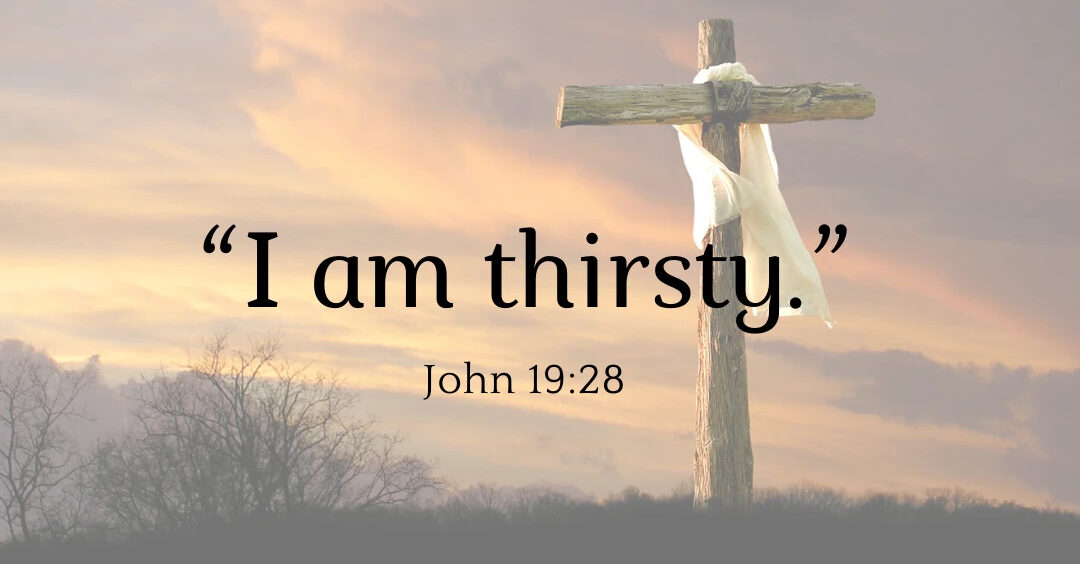“They gave him vinegar to drink mingled with gall: and when he had tasted thereof, he would not drink,” (Matt. 27:34).
It was customary for Roman soldiers to offer someone about to be crucified vinegar wine mixed with a bitter herb intended to dull the senses for this cross of death he was facing. But when this sedating mixture was offered to Jesus, he refused to drink it, likely so that he might bear the suffering of God’s wrath to its fullest extent (Matt. 27:34).
A few hours later as he was nearing the end of his life, however, Jesus was offered a second bitter drink when he cried out from the cross, “I thirst.” This time, “a sponge full of the sour wine on a hyssop branch” was given him (John 19:29), fulfilling that messianic psalm of David, “for my thirst they gave me vinegar to drink,” (Ps. 69:21).
Considering what he had been through – his fasting and sweating and bleeding, then spilling out what little remained of blood and water when his side was pierced through by the soldier – he would certainly be thirsty. And yet, greater is his thirst of soul to complete the mission to which he was ordained before the world began than the satisfaction of any of his own needs. As John 19:28 notes, he said “I thirst,” that, “the Scripture might be fulfilled.”
Christ knew before he asked that the drink they would give him would be out of that same bitter Marah of their inexhaustible malice (Exod. 15:23). He knew their grapes were grapes of gall and their clusters bitter because he knew their hearts. Still, Christ was prepared to drink from this cup of their malice as well as from the bitter cup of the wrath of his Father.
How ironic that the one here thirsty is the same God whose compassion is so beautifully demonstrated in this Old Testament invitation, “Come, everyone who thirsts, come to the waters; and he who has no money, come, buy and eat! Come, buy wine and milk without money and without price,” (Isa. 55:1). It is also that same compassion displayed in the New Testament when the Samaritan woman encounters the Savior at the well. He lovingly explains to her, “Everyone who drinks of this water will be thirsty again, but whoever drinks of the water that I will give him will never be thirsty again. The water that I will give him will become in him a spring of water welling up to eternal life,” (John 4:13-14).
He thirsted so that I may never thirst again. But do I, in turn, thirst for him? “As a deer pants for flowing streams, so pants my soul for you, O God,” (Ps. 42:1).
Contemplations:
- O my blessed Lord and Savior, you are the water of life (John 4:14). Whoever drinks of you shall never thirst again (John 14:1). You are the Vine which produces that purest wine. Help me both taste and see how gracious you are to me, Lord (Ps. 34:8). And help me also see that though my sins may seem to me as sweet as stolen waters (Prov. 9:17), to you they are waters of gall and wormwood (Jer. 9:15).
- O Lord, as it was for you, may my meat and drink be to do your will (John 4:34), and may I ever hunger and thirst after your righteousness (Matt. 5:6). Let me, with David, both walk in the paths of your precepts and run in the ways of your commandments (Ps. 19:7-14) so that I may at last, with him, wish that I had wings like a dove to fly unto my rest (Ps. 55:6).
- Do not let me feed on the carrion of corruption but rather on the pure and choice grain of your Word. Like the dove, let me love to sit by the clear streams of your Scripture (Song 5:12). Let me ever make my nest in the holes of the rock (Song 2:14), for your wounds are the only rock of my refuge (Ps. 18:1).
Further References for Matt. 27:34:
Psa. 69:21; Matt. 27:48; Mark 15:23; John 19:28


